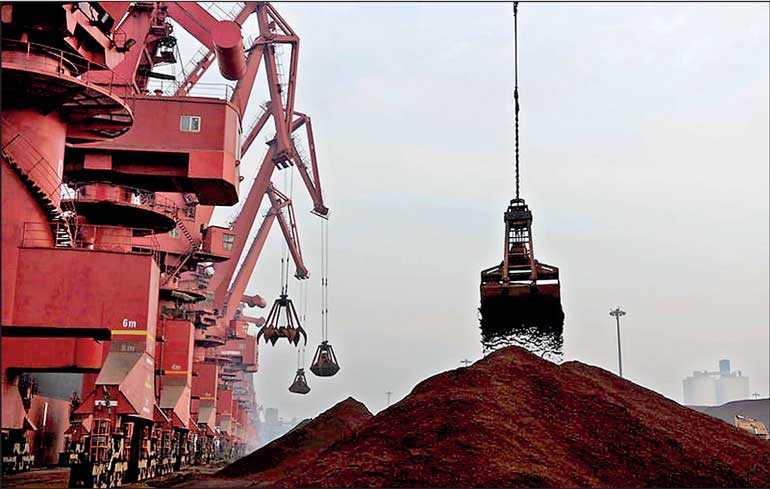Monday Feb 16, 2026
Monday Feb 16, 2026
Friday, 28 December 2018 00:00 - - {{hitsCtrl.values.hits}}
 Cranes unload iron ore from a ship at a port in Rizhao, Shandong province. China plans to remove import and export tariffs in 2019 on a range of goods, including import taxes on alternative meals used in animal feed, to secure supplies of raw materials amid trade tensions with the US and boosting outbound cargoes. — Reuters file photo
Cranes unload iron ore from a ship at a port in Rizhao, Shandong province. China plans to remove import and export tariffs in 2019 on a range of goods, including import taxes on alternative meals used in animal feed, to secure supplies of raw materials amid trade tensions with the US and boosting outbound cargoes. — Reuters file photo BEIJING (Reuters): China plans to remove import and export tariffs in 2019 on a range of goods, including import taxes on alternative meals used in animal feed, to secure supplies of raw materials amid trade tensions with the United States and boosting outbound cargoes.
Import tariffs on so-called alternative meals, which include rapeseed meal, cotton meal, sunflower meal and palm meal, will be removed from 1 January 2019, the finance ministry said in a statement on its website on Monday.
China’s trade war with the United States has unsettled the global soy market after China virtually stopped all imports of US soybeans after the imposition of additional 25% tariffs in July.
While China has resumed some purchases of US soybeans, the tariffs on the oilseed from America remain in place, and the removal of tariffs on alternative meals could help improve the reliability of supply of animal feed meal in China, analysts said.
“This is basically getting ready for a rainy day, as commercial purchases of US soybeans haven’t kicked off and so far it’s been just the state-owned firms that have done the buying,” said Monica Tu, analyst with Shanghai JC Intelligence Co. Ltd.
“Though the volume of alternative meal imports is not that huge, they can substitute soy. (The tax removal) is basically offering end users more options,” Tu said.
The United States is the second-largest soybean supplier to China and that component of the trade between the countries was worth $12 billion in 2017. China brings in soybeans to crush into meal for animal feed and cooking oil. The country has the world’s largest pig herd.
Beijing had previously sought ways to cut protein levels in animal feed and import more alternative meals, to reduce its reliance on US soybean shipments.
The most active rapeseed meal futures traded on Zhengzhou Commodity Exchange, for delivery in May, slid nearly 3% to 2,113 yuan ($306.26) per ton on the news.
China’s soymeal futures and soybean futures also fell 1.3% and 1.6%, respectively.
Import tariffs on materials of some pharmaceutical goods will also be cut to zero, according to the finance ministry.
To boost overall imports, China also reduced the amount of items taxed on a list of temporary import tariffs to slightly more than 700, the ministry said, from more than 900 items.
China will also maintain relatively low import tariffs for aircraft engines, at 1%, to help grow its indigenous plane-making industry. For exports, China will not levy any tariffs on 94 products next year including fertilisers, iron ore, slag, coal tar and wood pulp. It will also further cut most-favoured-nation tariffs on 298 information technology products from July 2019. The statement did not give details.
China’s economic growth slowed to 6.5% in the third quarter, the weakest pace since the global financial crisis and is expected to slow further next year amid the trade war with the United States.